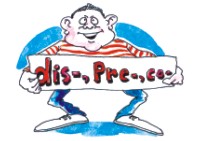One way of doing this is to add prefixes (such as dis -, pre- or co-) before the word.
Here's a list of common prefixes with their meanings and

some examples. anti (= against)
antibodies, anti-social

auto (= self)
autonomous, autobiography, automobile
bi (= two)
bicycle, bilateral
co (= with)
cooperate, coordinate
contra (= against)
contradict, contravene
|
de (= remove)
deregulate, deselect
dis (= not)
disappear, disconnect
il (= not)
illegal
im (= not)
immaterial, immature
inter (= between)
international
mis (= badly/wrongly)
misinform, misbehave, misunderstand
multi (= many)
 multinational multinational
non (= opposite)
non-profit
out (= more than)
outperform, outdone
over (= too much)
oversleep, overwork
post (= after)
postpone, postnatal
pre (= before)
predict
re (= again)
rewrite, relive
sub (= under)
submarine
super (= higher/improved)
supermarket
trans (= across)
transatlantic
uni (= one)
uniform
|
under (= not enough)
underpaid, underfed
Word Endings
You can also make new words from the words you already know by using different endings. For example, "The person who employs me has a fast car". You can make this sentence simpler, by replacing "the person who employs me" with "my employer". This gives you "My employer has a fast car."
In English you can make nouns from verbs (to employ - employer and employee) and verbs from nouns or adjectives (government - to govern, modern - to modernize) and so on. Learning what endings you can put on words means you can expand your vocabulary and say what you mean more easily.
Here are some common word endings:
Nouns
-er /- or: a person who does something

adviser / advisor, teacher, learner
-ian
optician, mathematician
-ment: result of action
improvement, advancement
-ism: name of system or belief
realism, optimism
-ist: the person who believes in the system
realist, optimist
-ion
confusion, apparition
-ness
happiness
-ship
leadership
-ence / ance
permanence, appearance
-acy
lunacy
-age
|
marriage
-ity
annuity
-y
photography
-cy
fluency
Verbs
-ify
falsify, modify
-ise
modernise

Adjectives -ic
idiotic, periodic
-ful

awful, wonderful
-able / ible
comfortable, terrible
-proof / resistant
waterproof, childproof, fireproof
-free
alcohol free beer, nuclear free zone
-less: without
hopeless, childless
|
